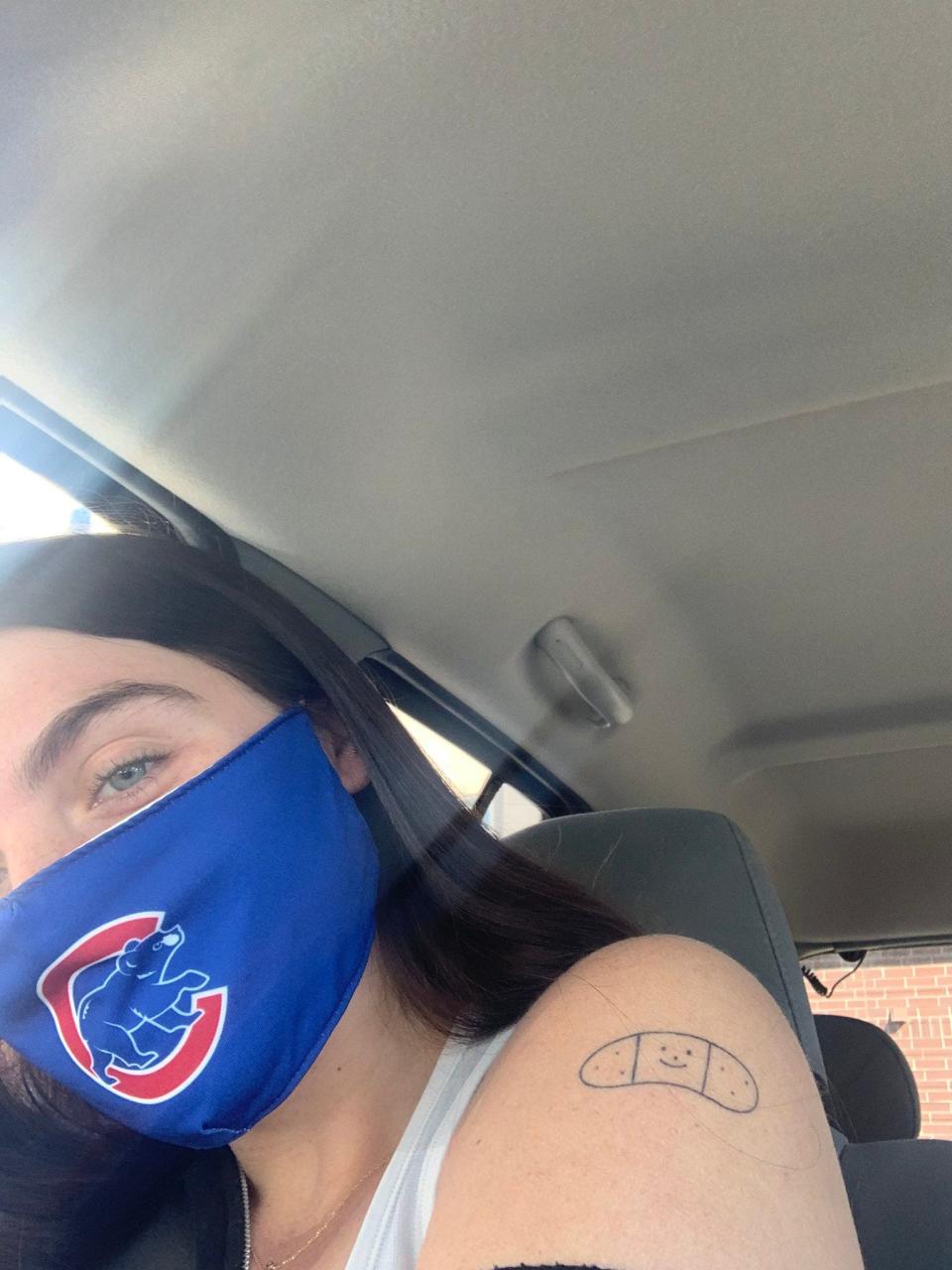Looking to get a tattoo? Artists say they're seeing increased demand, despite the pandemic
When Alana Swaringen found out COVID-19 vaccines were coming, she wanted to celebrate. She got a tattoo of a smiling Band-Aid, right where she’d soon get her vaccine.
“For me, it’s a reflection of the crazy year we’ve had and a celebration of my strength and what I’ve gone through this past year,” the 22-year-old Syracuse University student said.
When the health care worker gave her the vaccine in the middle of her smiling Band-Aid, she cried.
“It felt like the start of something new, finally overcoming something,” she said. “And the tattoo is a constant reminder of that.”

Despite permanent closings of countless tattoo shops earlier in the pandemic, many that survived told USA TODAY they've seen increased interest over the past few months. Increased demand may not be related to the vaccine, they said. Instead, they pointed to multiple factors including stimulus checks, warmer weather and pandemic boredom.
The increase in business isn't uncommon in the U.S. as spring hits, said Pat Sinatra, vice president of the Alliance of Professional Tattooists Inc., a professional international business league of tattoo artists, studios and apprentices.
“In many parts of the world and especially in the United States, warmer weather increases the interest in getting tattooed,” he said.
Sinatra added: “Also, with the receipt of tax refunds and stimulus checks and assuredly, the vaccine, we all will hopefully return to business as usual."
Grimes unveils her tattoos of 'beautiful alien scars': See the photo here
Duffy Foster, owner of Spokane’s Tiger Tattoo, one of the oldest tattoo shops in Washington state, said the increased interest he’s seen since reopening in June is likely due to people being bored.
“With no one going to restaurants, bars, sporting events, or music venues, I believe that tattoos have become the new ‘feel good food,'" he said.
He said he’s hearing from more and more vaccinated clients who are less worried about coming in for a tattoo. But the demand had been consistent long before vaccines were available, he said.
Collin Jordan, owner of Enclave Tattoo Studio in Gainesville, Florida, said his clientele has at least doubled over the last year. For a time, he had to turn off his business phone because he was getting too many requests.
“People think that if they go out and get a tattoo now, not a lot of people will be doing it right now,” he said. "But they don’t realize how crazy the volume is of people thinking the same thing.”
'Don't you have enough yet?' Justin Bieber's mom reacts to 'Peaches' singer's new neck tattoo
Jordan pointed to another reason for increased demands: stimulus payments. Each time stimulus money hit people’s bank accounts, he immediately saw “huge spikes” in business.
“With tattooing, it’s a luxury item, so people may not get tattoos unless they have that extra money,” he said. “So after the stimulus checks are out, people are going to get things they might not budget for, like tattoos.”
The influx of business comes after an anxious time for tattoo studios forced to shutter their doors during government-mandated shutdowns at the start of the pandemic.
Jordan's studio closed for three months, and he watched several other stores in his area shut down permanently.
“I was definitely worried when lockdown started,” Jordan said. “I didn’t know what was going to happen. And I certainly didn’t expect this on the other side.”
For Korie Pickett, co-owner of the Playground in Bloomington, Indiana, the pandemic forced the studio to make tough decisions.
“We had to decide if we were going to blow through both of our savings or allow the studio to die out,” Pickett said in an email.
But when the shop reopened in May after closing for two months, it saw a flood of support. Pickett said many of the shop's clients used tattooing as a form of therapy to cope with the trauma of the pandemic. Tattoos were something to look forward to in a bleak year.
“It all feels pretty unbelievable at times,” she said in an email. “For a while we felt like we were holding our breath.”
Adam Sky, owner of Morningstar Tattoo Parlor in Belmont, California, questioned if his studio would survive the pandemic. He watched larger, high-profile street shops close. But after the dust settled, he noticed many smaller, private and appointment-based studios like his thrive.
“When we reopened, we just got inundated with business," he said. "I’ve been tattooing for 30 years, and I’ve never seen business this crazy.”
By April, Sky was booked through the summer and had to find other tattoo artists to help him. After shutdowns, Sky said “there was this real hunger for people to get back in and get tattoos.”
“People have also been denied a lot of leisure activities during the pandemic and so they’re refocusing their spending on things they feel they can more safely do closer to home, like tattooing,” he said.
“If you want to get a tattoo, make sure you book well in advance because at most places it’s going to take some time for you to get in the chair,” he added.
Contact News Now Reporter Christine Fernando at cfernando@usatoday.com or follow her on Twitter at @christinetfern.
This article originally appeared on USA TODAY: Tattoo shop owners see more demand: COVID vaccine among reasons why

 Yahoo Movies
Yahoo Movies 
